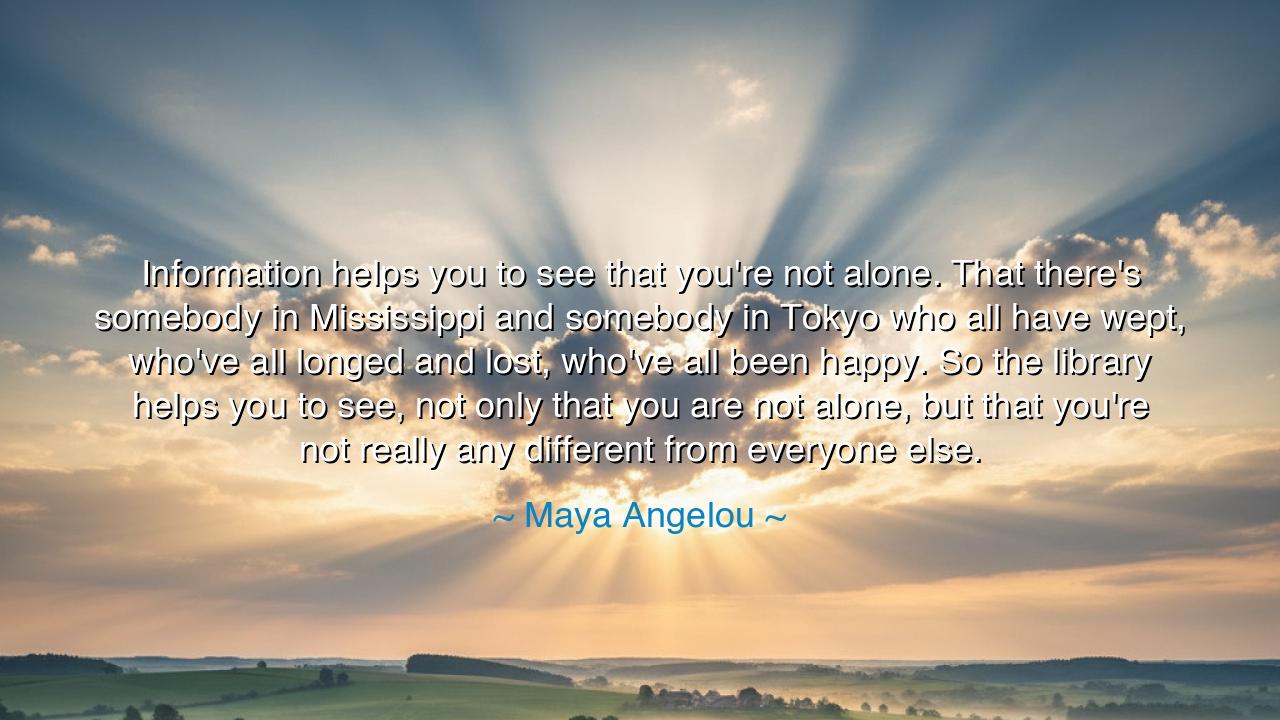
Information helps you to see that you're not alone. That there's
Information helps you to see that you're not alone. That there's somebody in Mississippi and somebody in Tokyo who all have wept, who've all longed and lost, who've all been happy. So the library helps you to see, not only that you are not alone, but that you're not really any different from everyone else.






"Information helps you to see that you're not alone. That there's somebody in Mississippi and somebody in Tokyo who all have wept, who've all longed and lost, who've all been happy. So the library helps you to see, not only that you are not alone, but that you're not really any different from everyone else." These profound words from Maya Angelou capture the essence of connection and shared humanity. Through information, especially the wealth of knowledge stored in places like libraries, we are reminded that the experiences we endure—our sorrow, joy, longing, and loss—are not uniquely ours. The library, as a symbol of collective human experience, shows us that no matter where we are in the world, whether in Mississippi or Tokyo, we are all connected by the same fundamental human emotions and experiences. We are reminded that we are part of something greater, and in this recognition, we find solace and strength.
In the ancient world, the idea of shared experience was deeply embedded in the stories told by poets and philosophers. Homer’s Iliad and Odyssey present the lives of heroes whose struggles with grief, love, war, and loss are deeply relatable, even thousands of years later. The Greeks understood that wisdom and empathy arise when we recognize the common threads that bind all human experiences. Even in the mythic stories of gods and mortals, the underlying truth was that all beings, divine or mortal, faced trials of the heart and spirit. Through these stories, people understood that their personal struggles were not isolated; they were part of a universal tapestry woven throughout time and space.
Consider Socrates, who taught that wisdom came not from a solitary understanding, but through dialogue and the exchange of ideas. Socrates believed that by engaging with others, we come to understand not just our own thoughts, but the collective experience of humanity. His philosophy was rooted in the idea that truth was not an individual pursuit but a shared journey, one that was shaped by the contributions of many. Just as Angelou speaks of the knowledge found in libraries, Socrates believed that by sharing our experiences, we come to realize that we are never truly alone in our thoughts or emotions. The library, whether it is a physical space or a figurative place of shared wisdom, is where this collective experience becomes visible.
In modern times, the significance of this idea can be seen in the way books and literature have brought people together across cultures and generations. One of the most remarkable examples is Victor Hugo's Les Misérables, which transcended time and place to show that the suffering of the poor, the sacrifice of the oppressed, and the redemption of the human soul are universal themes. Readers from France to Brazil to China have found themselves connected to the characters in ways that transcend language and culture. The library, with its vast repository of human thought and feeling, allows us to access these shared stories, reminding us that we are all part of a larger narrative.
The lesson in Angelou’s words is one of empathy and connection. Often, we find ourselves alone in our struggles, thinking that our experiences are unique or unshared by others. However, the wealth of information available to us—through books, history, and the stories of others—reminds us that we are part of a larger human story. Whether we experience joy or grief, love or loss, others have walked similar paths. This recognition not only alleviates the burden of feeling isolated but also empowers us to connect with others who share our human condition, no matter where they are in the world.
Angelou’s insight encourages us to embrace the power of knowledge and storytelling as tools to break down the walls that divide us. The act of learning from the experiences of others—whether through books, conversation, or personal reflection—helps us recognize the shared humanity that unites us all. It is a call to open our minds and hearts to the stories of those around us, to realize that we are all, in some way, fighting the same battles and celebrating the same victories. Libraries and books are more than just collections of information; they are bridges between souls, reminding us that in the grand scheme of life, we are never truly alone.
In our own lives, we can take this lesson to heart by not only seeking knowledge for our own growth but also by sharing our stories and experiences with others. Just as a library becomes a place of connection through the written word, so can we build a community of understanding through our conversations, our empathy, and our willingness to listen. We must make time to share what we know, not to hoard knowledge, but to extend the circle of human connection. In doing so, we help others feel that they, too, are part of something greater and are never truly alone in their struggles. By recognizing the universal nature of the human experience, we create a world of compassion, understanding, and shared humanity.






AAdministratorAdministrator
Welcome, honored guests. Please leave a comment, we will respond soon